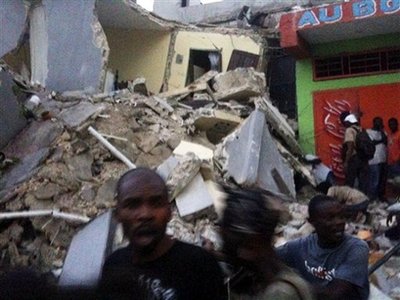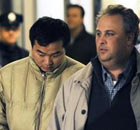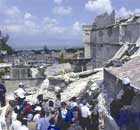Global General
Major quake hits Haiti; many casualties expected
(Agencies)
Updated: 2010-01-13 07:51
 |
Large Medium Small |
|
This photo provided by Carel Pedre shows people running past rubble of a damaged building in Port-au-Prince, Haiti, Tuesday, Jan. 12, 2010. The largest earthquake ever recorded in the area shook Haiti on Tuesday, collapsing a hospital where people screamed for help. [Agencies] |
The earthquake had a preliminary magnitude of 7.0 and was centered about 10 miles (15 kilometers) west of Port-au-Prince at a depth of 5 miles (8 kilometers), the US Geological Survey said. USGS geophysicist Kristin Marano called it the strongest earthquake since 1770 in what is now Haiti. In 1946, a magnitude-8.1 quake struck the Dominican Republic and also shook Haiti, producing a tsunami that killed 1,790 people.
The temblor appeared to have occurred along a strike-slip fault, where one side of a vertical fault slips horizontally past the other, said earthquake expert Tom Jordan at the University of Southern California. The earthquake's size and proximity to populated Port-au-Prince likely caused widespread casualties and structural damage, he said.
"It's going to be a real killer," he said. "Whenever something like this happens, you just hope for the best."
Most of Haiti's 9 million people are desperately poor, and after years of political instability the country has no real construction standards. In November 2008, following the collapse of a school in Petionville, the mayor of Port-au-Prince estimated about 60 percent of the buildings were shoddily built and unsafe in normal circumstances.
Tuesday's quake was felt in the Dominican Republic, which shares a border with Haiti on the island of Hispaniola, and some panicked residents in the capital of Santo Domingo fled from their shaking homes. But no major damage was reported there.
In eastern Cuba, houses shook but there were also no reports of significant damage.
"We felt it very strongly and I would say for a long time. We had time to evacuate," said Monsignor Dionisio Garcia, archbishop of Santiago.
The few reports emerging from Haiti made clear the country had suffered extensive damage.
"Everybody is just totally, totally freaked out and shaken," said Henry Bahn, a US Department of Agriculture official visiting Port-au-Prince. "The sky is just gray with dust."
Bahn said he was walking to his hotel room when the ground began to shake.
"I just held on and bounced across the wall," he said. "I just hear a tremendous amount of noise and shouting and screaming in the distance."
Bahn said there were rocks strewn about and he saw a ravine where several homes had stood: "It's just full of collapsed walls and rubble and barbed wire."
In the community of Thomassin, just outside Port-au-Prince, Alain Denis said neighbors told him the only road to the capital had been cut but that phones were all dead so it was hard to determine the extent of the damage.
"At this point, everything is a rumor," he said. "It's dark. It's nighttime."
Jocelyn Valcin, a resident of Boynton Beach, Flordia who flew in to Miami International Airport from Port-au-Prince on Tuesday evening, said he was at the airport when the earthquake hit.
"The whole building was cracked down," Valcin said. "The whole outside deteriorated."
Former President Bill Clinton, the UN's special envoy for Haiti, issued a statement saying his office would do whatever he could to help the nation recover and rebuild.
"My thoughts and prayers are with the people of Haiti," he said.
President Barack Obama ordered US officials to start preparing in case humanitarian assistance was needed.
Venezuelan Foreign Minister Nicolas Maduro said his government planned to send a military aircraft carrying canned foods, medicine and drinking water and also would dispatch a team of 50 rescue workers.
Haitian musician Wyclef Jean urged his fans to donate to earthquake relief efforts, saying he had received text messages from his homeland reporting that many people had died.
"We must think ahead for the aftershock, the people will need food, medicine, shelter, etc.," Jean said on his Web site.
Eva DeHart at the humanitarian organization For Haiti With Love in Palm Harbor, Fla., said colleagues at the group's base in Cap Haitien reported that town was spared damage. But they heard from people in Port-au-Prince that many government buildings were damaged. "That's going to have a major effect on coordinating aid," she said.
In Miami's Little Haiti neighborhood, dozens of people gathered at the Veye-Yo community center, where a pastor led them in prayer. Members embraced each other as they tried to contact relatives back home.
Tony Jeanthenor said he had succeeded in reaching a family friend in Haiti who told of hearing people cry out for help from under debris.
"The level of anxiety is high," Jeanthenor said. "Haiti has been through trauma since 2004, from coup d'etat to hurricanes, now earthquakes."







